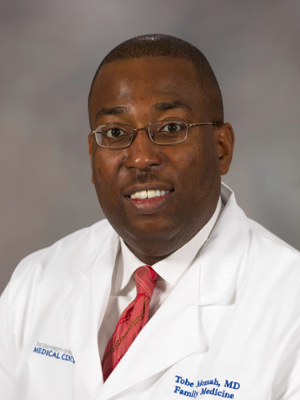How to know when a minor burn could be a major injury
You turn on the water in the kitchen sink to wash your hands, and realize too late that the water is not warm, but instead, scalding hot.
The commercial bleach you’re using to clean your driveway splashes across your feet, and your sandals offer no real protection.
Burn injuries happen most commonly at home and in the kitchen, but how do you know if what seems like a minor skin burn should receive immediate medical attention?
For starters, consider the burn’s size and location on the body, a University of Mississippi Medical Center family medicine physician advises.

“The position of the burn can make a difference,” said Dr. Tobe Momah, an associate professor in the Department of Family Medicine. “If the burn is located at a joint like the wrist, elbow or knee, you should be evaluated. If the burn is on the genitals, feet or face, there can be complications if it’s not treated early.”
Small burns that are superficial, and not draining but healing well, can likely be treated at home with a cold compress, Momah said. “But if it’s bigger than a coin, you definitely need to have a provider look at it,” he said. “If it covers 10 percent or more of your body, you need to be seen immediately.”
UMMC in January announced the establishment of the Mississippi Burn Center on the Jackson campus. A multidisciplinary team of specialists and providers will care for patients who have suffered significant and severe burns. Some of these patients may have other injuries that are just as traumatic as their burns, which makes multidisciplinary care all the more critical.
The most common minor burns seen in family medicine are experienced by people who work with chemicals, or people who have been burned by hot water, Momah said. “In a regular primary care setting, hot water is No. 1.”
For burns you believe likely are minor, Momah said, the first line of treatment is getting away from the source of the burn.
“After that, the most common recommendation is to run cold water over it to cool it down, and then cover it to prevent infection,” he said. “In our clinic, we apply Silvadene cream in the initial stages.”
Silver sulfadiazene, the generic name of Silvadene, is used with other treatments to help prevent and treat wound infections in patients with burns. It requires a prescription “and helps the skin to heal and regenerate,” Momah said.
Cover the wound with a dressing such as petroleum gauze, a non-adherent, sterile knitted gauze dressing that contains petroleum jelly, Momah suggests. Stay away from butter, oils or over-the-counter burn creams that aren’t FDA-approved or proven to appropriately treat burns, he said.
Special care must be taken in handling chemical burns from sources such as drain cleaner, paint or paint thinner, industrial bleach, heating oil or acids. Momah recommends donning gloves to clean such burns, which can cause extensive tissue damage.
Major chemical burns three inches or larger require emergency treatment, but those that are minor can be flushed with cool water for at least 10 minutes, then covered with petroleum gauze.
Momah encourages anyone with a burn larger than the palm of their hand, or whose burn is a significant depth or in a significant location, to have a provider examine it promptly. And if time and access are limitations, he said, telehealth is a great first option.
Through UMMC 2 You, the Medical Center’s urgent care telehealth, “we can see the patient and be able to visualize the wound,” Momah said. “It helps the provider to make a treatment decision based on what they see, and that’s especially useful if you live three or four hours away from a hospital.”
If you’re unsure whether a burn was caused by exposure to a toxic chemical, experts at UMMC’s Poison Control Center can help. The Center is staffed 24/7; call 1-800-222-1222. The Department of Family Medicine offers same-day appointments at its Lakeland Drive and Flowood clinics for evaluation, diagnosis and treatment of acute minor injuries.
The above article appears in CONSULT, UMMC’s monthly e-newsletter sharing news about cutting-edge clinical and health science education advances and innovative biomedical research at the Medical Center and giving you tips and suggestions on how you and the people you love can live a healthier life. Click here and enter your email address to receive CONSULT free of charge. You may cancel at any time.



